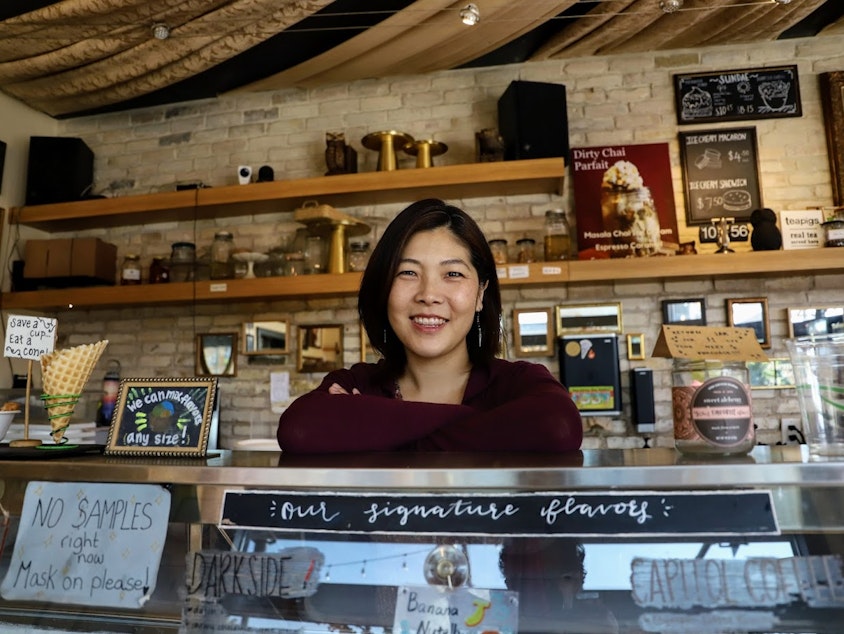U District businesses on edge amid string of recent violence
Seattle Police continue to investigate a recent shooting outside a University District bar that injured four students. So far, no arrests have been made.
For now, SPD is increasing its presence in the neighborhood, where hopes for a vibrant comeback have been marred by violent incidents in the past month.
The start of the school year is bringing more foot traffic to the University District.
Business owners like Lois Ko are glad.
“Honestly, it feels really good,” said Ko, owner of Sweet Alchemy Ice Creamery on Northeast 43rd Street. “It feels lively again.”
Ko said it’s good to see people out and about—not just students.
“There’s a good mix of people, which really feels good,” Ko said. “For a few years we didn’t see any kids in our streets but I see kids coming to the U Bookstore with their parents again now. So yeah, it feels good.”
Sponsored
Ko said that kind of foot traffic is helping bring the Ave back to life after years of struggling through the pandemic. But even before Covid, Ko said years of the light rail station construction disrupted business. Now that the station is open and students are back, things were starting to feel normal again.

But that sense of normalcy has been shattered once more, following a series of shootings in the neighborhood. Ko worries about the impacts on business and on her staff’s safety.
“Ninety percent of my staff being students — it really affected my concerns for how their safety needs to be reevaluated,” she said.
Safety is top of mind for businesses here.
Sponsored
Aek Chaipet is with Jai Thai on 42nd and University Way. He said the restaurant used to stay open until 2 a.m. But they were forced to close earlier after the business was robbed more than once.
“They come get in the restaurant and use the big gun to take money, phones,” he recalled.
Chaiphet said Seattle Police’s recent increased presence helps. But he hopes the patrols do more than just drive by.
Further down the street, Kanan Abu at Sultan’s Gyros is tending to the grill, prepping for the lunch crowd. In his 12 years here, Abu said he’s seen a lot from the takeout window. But he’s been dismayed by how things have gotten worse. Whenever he calls the police to report a crime, he said the response has been the same.
"When you call the police, [they ask], 'someone hurt? No? Okay, stay away from them, don’t talk to them.' That’s it. 'File online; do your complain online.'"
Sponsored
According to SPD’s Crime Dashboard, there have been 135 reported incidents of violent crime in the U District so far this year. There were 184 incidents reported last year.
Meanwhile, the city is using different approaches to address public safety. The Office of Economic Development has launched the Storefront Repair Fund to help businesses pay for property damages. At a recent press conference, Mayor Bruce Harrell said it’s part of a multi-pronged strategy to make the neighborhood safe.
“We believe in a comprehensive approach to public safety,” said Harrell, “where economic revitalization, and beautification, and creating welcoming, activated spaces becomes part of our critical strategy.”
Businesses say they welcome all these steps. But they also add that many of the issues they regularly grapple with are more complex than they’re equipped to handle.
Lois Ko of Sweet Alchemy said they often encounter people with severe mental health problems.
Sponsored
“There was a guy with a broken bottle and he stabbed someone nearby us,” she recalled. Police were called, she added, and the man was arrested. But he was back on the Ave soon after.
This revolving door approach, Ko said, is not working.
"If they have a chronic mental illness, then it needs to be addressed and helped. Not just be like, 'Oh we don’t have a bed for you, go wander the streets until the next time you come in and maybe there’s a bed for you.'"
Plus, Ko said, it’s a lot to ask her young employees to deal with these types of situations which put them at risk.




